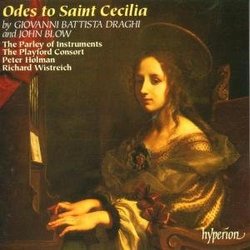| All Artists: Playford Consort Title: Draghi; Blow: Odes to Saint Cecilia (English Orpheus Vol 31) /The Parley of Instruments * The Playford Consort * Holman * Wistreich Members Wishing: 1 Total Copies: 0 Label: Hyperion UK Release Date: 7/18/1995 Genre: Classical Styles: Opera & Classical Vocal, Chamber Music, Historical Periods, Classical (c.1770-1830), Modern, 20th, & 21st Century Number of Discs: 1 SwapaCD Credits: 1 UPC: 034571167701 |
Search - Playford Consort :: Draghi; Blow: Odes to Saint Cecilia (English Orpheus Vol 31) /The Parley of Instruments * The Playford Consort * Holman * Wistreich
 | Playford Consort Draghi; Blow: Odes to Saint Cecilia (English Orpheus Vol 31) /The Parley of Instruments * The Playford Consort * Holman * Wistreich Genre: Classical |
Larger Image |
CD Details |
CD ReviewsFamiliar text, unfamiliar (but wonderful) music scott | Calgary, Canada | 12/16/2005 (5 out of 5 stars) "This disc contains two odes for St. Cecilia' Day, November 22 which was often celebrated with music in late 17th century England. The ode by Blow is a nice addition to his catalog, but is not particularly notable. I think Blow could be very inspired, but this ode is really only average, which means it is fairly good, but just not special. The Draghi ode, on the other hand, is brilliant, and compares well with Purcell's 1692 Hail! Bright Cecilia. The text of the Draghi ode was penned by Dryden, and is best known from Handel's setting from the early 18th century. It opens with a mysterious sounding orchestral symphony which leads into the first chorus. This homophonic chorus, interspersed with solos, moves into a glorious fugue. There follows a series of solo movements, many of them very inventive. The solo alto and bass are featured prominently, and both Michael Chance and Richard Wistreich do a stunning job. The other soloists are Suzie le Blanc, and Joseph Cornwell, both very good also. The last chorus is another winner, and brings this magnificent piece to a grand close. The sense of scale throughout this ode is impressive, and makes it feel very substantial and special. This is the only vocal piece by Draghi to survive, which is lamentable, for this is a tremendous work, full of originality, and just plain beautiful music. One wonders if Purcell heard this work, because I can see how it could have influenced his later Cecilian odes. This is the work of a master, and if you can locate a copy of this disc, I highly recommend it." A voice teacher and early music fan George Peabody | Planet Earth | 06/10/2006 (5 out of 5 stars) "DRAGHI AND BLOW YOUR MUSIC IS FINE, BUT IT TOOK MICHAEL CHANCE TO MAKE IT SUBLIME!
The origin of the English custom of celebrating St. Cecelia's Day, November 22,with a concert featuring the performance of a specially-composed ode is unknown. The earliest surviving ode, Purcell's "Welcome to all the Pleasures", was written in 1683. The first ode on this disc by Draghi,written in 1687, entitled "From Harmony, From Heavenly Harmony" has a grandeur and vividness that was matched by Purcell only in his most ambitious odes. The text is a poem by John Dryden and is divided into l0 sections. The opening section, played by the strings, is in a minor key, and if it were not for the strong pulsing beat, it would sound ominous, but then follows the lovely rich sound of Michael Chance singing 'Harmony, from heavenly harmony' which makes a great contrast to the opening. Throughout the work there is much variety both vocally and instrumentally. There is rich 5-part string writing, scoring for trumpets and timpani and not only 5-part choral writing, but some spectacular bass and countertenor solos.such as :'The soft complaining flute' (countertenor) and 'Orpheus could lead the savage race'. John Blow's setting of Thomas D'Urfey's 1691 St. Cecelia ode:"The Glorious Day to Come" is quite innovative, if not a bit uneven. Blow was dissatified with the 'patchwork' design of his earlier odes, and tried to unify this work by subjecting a dotted figure in the fugue of the opening symphony to a series of transformations in later sections. It is a rare example for the sort of thematic interrelationships between movements that composers began to develop about 100 years later. As in Draghi's ode there is much variety in instrumentation and voices. Having said all of this, I have to say that the album delighted me!!!It's HAPPY! Chance as the countertenor did most of the solo work throughout these odes, and he was in his element! In fact all of the voices were quite skilled in their renditions and one could ascertain that they all were experienced in this genre. The instrumental accompaniment was well done and I know I'll be playing this recording often!" |
